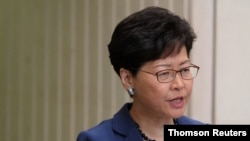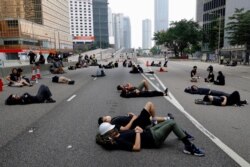Hong Kong's pro-Beijing leader Carrie Lam offered an apology Tuesday for the political crisis and unrest sparked by a proposed law that would allow extraditions to mainland China. But she did not give in to protester's demands that she leave office over her handling of the controversial bill.
Lam told reporters work on the bill was over until it expires in July next year, but she also pledged to stay and finish the remainder of her term.
"I have heard you loud and clear and have reflected deeply on all that has transpired,” Lam said adding that she had to “personally” shoulder much of the responsibility surrounding the legislative bill.
“I would like to tender my sincere apology to Hong Kong,” she said.
Opposition to the bill has driven repeated mass protests in Hong Kong this month. Organizers said two million people turned out Sunday.
While the bill would allow for Hong Kong to extradite to a number of jurisdictions on a case by case basis where it does not have a long term agreement, the prospect of extradition to China in particular has alarmed a wide cross-section of Hong Kong society.
Many protesters and pro-democracy legislators call it an "evil bill" or "evil law," which they see as an infringement on Hong Kong's autonomy, which was promised to the former British colony until 2047.
Meanwhile the United States voiced new support Monday for the protesters.
State Department spokesman Morgan Ortagus said the demonstrators were engaged in peaceful protests for "things which are enshrined into basic law."
She said the demonstrators were marching "for the rights of freedom of speech, for freedom of assembly.... And so of course, as we observe these, we continue to call on the Hong Kong government to address the concerns of their public."
Hong Kong democracy activist Joshua Wong joined the throngs of protesters calling for Lam's resignation after he was released from prison Monday.
Last week, riot police used tear gas, pepper spray and rubber bullets on primarily youthful protesters who had surrounded the legislature and were attempting to occupy major roads in a similar manner to the 2014 Umbrella Movement democracy protesters.
The Umbrella Movement demonstrations were launched to demand the direct election of the city's top leader after China reneged on promises of universal suffrage by 2017. The protests ended without winning any concessions from the Hong Kong government.
Hong Kong, a former British colony, was granted special autonomy for 50 years after it returned to Chinese sovereignty in 1997. But many in Hong Kong are concerned China is slowly encroaching on those rights and tightening its grip on the territory.





